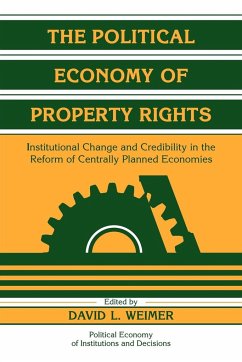WeimerInstitutional Change and Credibility in the Reform of Centrally Planned Economies
The Political Economy of Property Rights
Institutional Change and Credibility in the Reform of Centrally Planned Economies
Herausgeber: Weimer, David L.
WeimerInstitutional Change and Credibility in the Reform of Centrally Planned Economies
The Political Economy of Property Rights
Institutional Change and Credibility in the Reform of Centrally Planned Economies
Herausgeber: Weimer, David L.
- Broschiertes Buch
- Merkliste
- Auf die Merkliste
- Bewerten Bewerten
- Teilen
- Produkt teilen
- Produkterinnerung
- Produkterinnerung
A 1997 investigation of the transformation of property rights in post-communist countries and China.
Andere Kunden interessierten sich auch für
![The Global Political Economy of Intellectual Property Rights The Global Political Economy of Intellectual Property Rights]() Christopher MayThe Global Political Economy of Intellectual Property Rights64,99 €
Christopher MayThe Global Political Economy of Intellectual Property Rights64,99 €![The Global Political Economy of Intellectual Property Rights, 2nd ed The Global Political Economy of Intellectual Property Rights, 2nd ed]() Christopher MayThe Global Political Economy of Intellectual Property Rights, 2nd ed71,99 €
Christopher MayThe Global Political Economy of Intellectual Property Rights, 2nd ed71,99 €![The Political Institution of Private Property The Political Institution of Private Property]() Itai SenedThe Political Institution of Private Property27,99 €
Itai SenedThe Political Institution of Private Property27,99 €![Housing, Land, and Property Rights in Post-Conflict United Nations and Other Peace Operations Housing, Land, and Property Rights in Post-Conflict United Nations and Other Peace Operations]() Housing, Land, and Property Rights in Post-Conflict United Nations and Other Peace Operations61,99 €
Housing, Land, and Property Rights in Post-Conflict United Nations and Other Peace Operations61,99 €![Property Companies and the Construction Industry in Britain Property Companies and the Construction Industry in Britain]() Hedley SmythProperty Companies and the Construction Industry in Britain56,99 €
Hedley SmythProperty Companies and the Construction Industry in Britain56,99 €![Inventory of the Polls and Ratable Property in the Town of Fitzwil-Liam N. H., April 1, 1920 Inventory of the Polls and Ratable Property in the Town of Fitzwil-Liam N. H., April 1, 1920]() AnonymousInventory of the Polls and Ratable Property in the Town of Fitzwil-Liam N. H., April 1, 192020,99 €
AnonymousInventory of the Polls and Ratable Property in the Town of Fitzwil-Liam N. H., April 1, 192020,99 €![Globalising Intellectual Property Rights Globalising Intellectual Property Rights]() Duncan MatthewsGlobalising Intellectual Property Rights80,99 €
Duncan MatthewsGlobalising Intellectual Property Rights80,99 €-
-
-
A 1997 investigation of the transformation of property rights in post-communist countries and China.
Hinweis: Dieser Artikel kann nur an eine deutsche Lieferadresse ausgeliefert werden.
Hinweis: Dieser Artikel kann nur an eine deutsche Lieferadresse ausgeliefert werden.
Produktdetails
- Produktdetails
- Verlag: Cambridge University Press
- Seitenzahl: 384
- Erscheinungstermin: 25. November 2010
- Englisch
- Abmessung: 229mm x 152mm x 23mm
- Gewicht: 622g
- ISBN-13: 9780521180702
- ISBN-10: 0521180708
- Artikelnr.: 32312246
- Herstellerkennzeichnung
- Libri GmbH
- Europaallee 1
- 36244 Bad Hersfeld
- gpsr@libri.de
- Verlag: Cambridge University Press
- Seitenzahl: 384
- Erscheinungstermin: 25. November 2010
- Englisch
- Abmessung: 229mm x 152mm x 23mm
- Gewicht: 622g
- ISBN-13: 9780521180702
- ISBN-10: 0521180708
- Artikelnr.: 32312246
- Herstellerkennzeichnung
- Libri GmbH
- Europaallee 1
- 36244 Bad Hersfeld
- gpsr@libri.de
1. The political economy of property rights David L. Weimer; 2. Credible
commitment and property rights: the role of strategic interaction between
political and economic actors Daniel Diermeier, Joel Ericson, Timothy Frye,
and Steven Lewis; 3. The political commitment to markets and marketization:
comment on 'Credible commmitment and property rights' Barry R. Weingast; 4.
Political determinants of the success of economic transition Nikolai
Mikhailov; 5. Comment on 'Political determinants of the success of economic
transition' Adam Przeworski; 6. Russian privatization and the problem of
credible commitment Timothy Frye; 7. Three issues of credible commitment
and Russian privatization John M. Litwack; 8. Legislative politics and the
political economy of property rights in post-Communist Russia Brendan
Kiernan and Francis X. Bell; 9. Commitment, coordination, and the demise of
the post-Communist parliament in Russia Steven S. Smith; 10. Private firms,
city governments, and arbitration: enforcing economic legality in St.
Petersburg Jole Meyer Ericson; 11. Comment on 'Private firms, city
governments, and arbitration: enforcing economic legality in St.
Petersburg' Anthony Jones; 12. Property rights and institutional change in
the Czech and Slovac Republics Mariusz Mark Dobek; 13. Comment on 'Property
rights and institutional change in the Czech and Slovac Republics' Sharon
Wolchik; 14. Institutional structures, labor interests, and evolving
privatization bargains in Poland Lorene Allio; 15. Comment on
'Institutional structures, labor interests, and evolving privatization
bargains in Poland' Bartlomeij Kaminski; 16. Privatization as institutional
change in Hungary László Urbán; 17. Comment on 'Privatization as
institutional change in Hungary' Kálmán Mizsei; 18. Marketization and
government credibility in Shanghai: federalist and local corporatist
explanations Steven Lewis; 19. Federalist and corporatist theories: a
comment on an empirical test Victor Nee; 20. Learning about the economy:
property rights and the collapse of the East German industrial economy
Hannes Wittig; 21. Misinformation, insecure property rights, and the
collapse of the East German economy Susanne Lohmann; 22. Post-Communist
privatization as a test of theories of institutional change Lorene Allio,
Mariusz Mark Dobek, Nikolia Mikhailov, and David L. Weimer; 23. Explaining
the complexity of institutional change Jack Knight and Douglass C. North.
commitment and property rights: the role of strategic interaction between
political and economic actors Daniel Diermeier, Joel Ericson, Timothy Frye,
and Steven Lewis; 3. The political commitment to markets and marketization:
comment on 'Credible commmitment and property rights' Barry R. Weingast; 4.
Political determinants of the success of economic transition Nikolai
Mikhailov; 5. Comment on 'Political determinants of the success of economic
transition' Adam Przeworski; 6. Russian privatization and the problem of
credible commitment Timothy Frye; 7. Three issues of credible commitment
and Russian privatization John M. Litwack; 8. Legislative politics and the
political economy of property rights in post-Communist Russia Brendan
Kiernan and Francis X. Bell; 9. Commitment, coordination, and the demise of
the post-Communist parliament in Russia Steven S. Smith; 10. Private firms,
city governments, and arbitration: enforcing economic legality in St.
Petersburg Jole Meyer Ericson; 11. Comment on 'Private firms, city
governments, and arbitration: enforcing economic legality in St.
Petersburg' Anthony Jones; 12. Property rights and institutional change in
the Czech and Slovac Republics Mariusz Mark Dobek; 13. Comment on 'Property
rights and institutional change in the Czech and Slovac Republics' Sharon
Wolchik; 14. Institutional structures, labor interests, and evolving
privatization bargains in Poland Lorene Allio; 15. Comment on
'Institutional structures, labor interests, and evolving privatization
bargains in Poland' Bartlomeij Kaminski; 16. Privatization as institutional
change in Hungary László Urbán; 17. Comment on 'Privatization as
institutional change in Hungary' Kálmán Mizsei; 18. Marketization and
government credibility in Shanghai: federalist and local corporatist
explanations Steven Lewis; 19. Federalist and corporatist theories: a
comment on an empirical test Victor Nee; 20. Learning about the economy:
property rights and the collapse of the East German industrial economy
Hannes Wittig; 21. Misinformation, insecure property rights, and the
collapse of the East German economy Susanne Lohmann; 22. Post-Communist
privatization as a test of theories of institutional change Lorene Allio,
Mariusz Mark Dobek, Nikolia Mikhailov, and David L. Weimer; 23. Explaining
the complexity of institutional change Jack Knight and Douglass C. North.
1. The political economy of property rights David L. Weimer; 2. Credible
commitment and property rights: the role of strategic interaction between
political and economic actors Daniel Diermeier, Joel Ericson, Timothy Frye,
and Steven Lewis; 3. The political commitment to markets and marketization:
comment on 'Credible commmitment and property rights' Barry R. Weingast; 4.
Political determinants of the success of economic transition Nikolai
Mikhailov; 5. Comment on 'Political determinants of the success of economic
transition' Adam Przeworski; 6. Russian privatization and the problem of
credible commitment Timothy Frye; 7. Three issues of credible commitment
and Russian privatization John M. Litwack; 8. Legislative politics and the
political economy of property rights in post-Communist Russia Brendan
Kiernan and Francis X. Bell; 9. Commitment, coordination, and the demise of
the post-Communist parliament in Russia Steven S. Smith; 10. Private firms,
city governments, and arbitration: enforcing economic legality in St.
Petersburg Jole Meyer Ericson; 11. Comment on 'Private firms, city
governments, and arbitration: enforcing economic legality in St.
Petersburg' Anthony Jones; 12. Property rights and institutional change in
the Czech and Slovac Republics Mariusz Mark Dobek; 13. Comment on 'Property
rights and institutional change in the Czech and Slovac Republics' Sharon
Wolchik; 14. Institutional structures, labor interests, and evolving
privatization bargains in Poland Lorene Allio; 15. Comment on
'Institutional structures, labor interests, and evolving privatization
bargains in Poland' Bartlomeij Kaminski; 16. Privatization as institutional
change in Hungary László Urbán; 17. Comment on 'Privatization as
institutional change in Hungary' Kálmán Mizsei; 18. Marketization and
government credibility in Shanghai: federalist and local corporatist
explanations Steven Lewis; 19. Federalist and corporatist theories: a
comment on an empirical test Victor Nee; 20. Learning about the economy:
property rights and the collapse of the East German industrial economy
Hannes Wittig; 21. Misinformation, insecure property rights, and the
collapse of the East German economy Susanne Lohmann; 22. Post-Communist
privatization as a test of theories of institutional change Lorene Allio,
Mariusz Mark Dobek, Nikolia Mikhailov, and David L. Weimer; 23. Explaining
the complexity of institutional change Jack Knight and Douglass C. North.
commitment and property rights: the role of strategic interaction between
political and economic actors Daniel Diermeier, Joel Ericson, Timothy Frye,
and Steven Lewis; 3. The political commitment to markets and marketization:
comment on 'Credible commmitment and property rights' Barry R. Weingast; 4.
Political determinants of the success of economic transition Nikolai
Mikhailov; 5. Comment on 'Political determinants of the success of economic
transition' Adam Przeworski; 6. Russian privatization and the problem of
credible commitment Timothy Frye; 7. Three issues of credible commitment
and Russian privatization John M. Litwack; 8. Legislative politics and the
political economy of property rights in post-Communist Russia Brendan
Kiernan and Francis X. Bell; 9. Commitment, coordination, and the demise of
the post-Communist parliament in Russia Steven S. Smith; 10. Private firms,
city governments, and arbitration: enforcing economic legality in St.
Petersburg Jole Meyer Ericson; 11. Comment on 'Private firms, city
governments, and arbitration: enforcing economic legality in St.
Petersburg' Anthony Jones; 12. Property rights and institutional change in
the Czech and Slovac Republics Mariusz Mark Dobek; 13. Comment on 'Property
rights and institutional change in the Czech and Slovac Republics' Sharon
Wolchik; 14. Institutional structures, labor interests, and evolving
privatization bargains in Poland Lorene Allio; 15. Comment on
'Institutional structures, labor interests, and evolving privatization
bargains in Poland' Bartlomeij Kaminski; 16. Privatization as institutional
change in Hungary László Urbán; 17. Comment on 'Privatization as
institutional change in Hungary' Kálmán Mizsei; 18. Marketization and
government credibility in Shanghai: federalist and local corporatist
explanations Steven Lewis; 19. Federalist and corporatist theories: a
comment on an empirical test Victor Nee; 20. Learning about the economy:
property rights and the collapse of the East German industrial economy
Hannes Wittig; 21. Misinformation, insecure property rights, and the
collapse of the East German economy Susanne Lohmann; 22. Post-Communist
privatization as a test of theories of institutional change Lorene Allio,
Mariusz Mark Dobek, Nikolia Mikhailov, and David L. Weimer; 23. Explaining
the complexity of institutional change Jack Knight and Douglass C. North.








